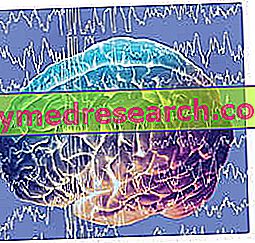Bulimia Nervosa
Bulimia nervosa is a eating behavior disorder (DCA) characterized by the fear of gaining weight and a strong desire to lose weight.
Typical bulimic attitudes include excessive food restriction and loss of control over food.
The control leads to binge eating and is followed by purgation methods, such as self-induced vomiting or the use of laxatives. Some practice motor compensation by performing excessively intense and / or protracted physical activity (often on an empty stomach).

The causes are unclear and it is assumed that the pathological mechanism concerns the psychic and socio-cultural sphere. Bulimia nervosa is often affected by psychiatric comorbidities such as anxious symptoms or disorders, depression, self-injury and obsessive-compulsive syndrome. Sometimes, alcohol abuse and the use of drugs are associated.
The complications related to bulimia nervosa are of various kinds.
From the mental point of view, if left untreated, this condition can worsen and become chronic. Sometimes it turns into anorexia nervosa.
As far as the physical aspect is concerned, bulimia does not necessarily cause excessive weight loss. On the contrary, even normal or overweight cases seem to be frequent. This means that the risk of malnutrition is lower and less severe compared to anorexia nervosa.
However, some complications related to compensation methods can be shown. Among these: dental or oral cavity pathologies (for self-induced vomiting), intestinal disorders (for laxatives), metabolic problems (hypoglycemic peaks, hypotensive, fainting etc). muscle-joint (excessive fatigue and stress due to physical activity), specific nutritional vitamin and / or salt deficiencies.
The treatment of bulimia nervosa is difficult. It is based on the multidisciplinary intervention that recruits four distinct professional figures: psychiatrist, psychologist, internist and dietitian.
Dietary implications
The dietary pattern for bulimia nervosa is NOT curative; in fact, it subordinates to an adequate psychological therapy (for example behavioral therapy) and psychiatric therapy (drugs).
The diet is however necessary to restore nutritional balance and has a very important educational function. In particular, it helps the bulimic to tidy up the diet and gain control over food, allowing him to manage the diet without leading to purgation / compensation.
Before continuing, it is necessary to point out that the treatment of bulimia nervosa is not simple. Most cases require several attempts; on the other hand, the perception of failure can aggravate the psychological condition.
The bulimics do not willingly speak of their disorder. In general, this confidentiality is caused by shame about one's behavior and sometimes one's appearance.
When bulimia nervosa creates a balance between binges and methods of purgation / compensation, allowing weight to be maintained, a difficult condition to "unblock" is established. Unfortunately, hiding their behavior, the bulimic delays the medical diagnosis for several months or even years compared to the appearance.
NB . Often, the bulimic conceals the real objective of compulsive motor activity (weight loss), disguised as a competitive athlete.
Characteristics of the Diet
WARNING! bulimia nervosa is NOT a condition that can be treated independently. Consultation with specialists at specialized centers is recommended.
The diet for bulimia nervosa must show some indispensable characteristics, which concern the food sector and above all the psychic-behavioral one.
The table summarizes some of the fundamental elements for the diet of the bulimic subject.
| NUTRITIONAL CHARACTERISTICS | EDUCATIONAL FEATURES |
Normocaloric food regime . The bulimic should never be encouraged to lose weight, especially in the case of normal weight. The diet must meet all the nutritional balance requirements. | Diet that guarantees NOT to get fat . As anticipated, it is necessary to reduce stress, anxiety and the fear of gaining weight. It is possible to reduce the psychological causes triggering bulimic attacks, guaranteeing a diet that allows to maintain weight. |
In the case of severe metabolic disorders and obesity, a slightly low-calorie diet may be necessary . Keeping the above in mind, if the subject shows obvious obesity with metabolic disorders, it may be necessary to promote weight loss. The decision is of medical interest (psychiatrist and medical internist). | Unaccustomed to the feeling of hunger . It is typical of prolonged fasts that follow binge eating. In the bulimic, the compulsive need to eat has a much deeper root than the trivial physiological stimuli. Nevertheless, disaccustoming the patient's mind to perceiving the physiological impulses of hunger can help a great deal to reduce binge eating. |
Variety . Alternate foods and try to consume at least one food for each basic food group. This is an aspect that, in the long term, favors the coverage of various nutritional needs. Moreover, it allows to debunk dietary preconceptions, often well rooted in eating disorders (for example, "pasta is fattening"). | Avoid using food in conditions of anxiety or depression . By eliminating the habit of consuming high-calorie foods when the mood is compromised, you can avoid feelings of guilt and the consequent means of compensation. It is interesting to note that anxiety predisposes to a greater consumption of salty and crunchy foods, while depression contributes to sweet and creamy foods. However, during bingeing, the bulimic is not always fully aware of what and how much he is eating. |
Supplements and drugs . If necessary, the bulimic must use drugs or over-the-counter products to cover nutritional needs. The decision is up to the doctor and dietitian. To learn more: Drugs for bulimia nervosa | Eat meals in company . Conviviality is a preventive factor for eating disorders. Eating in company is a very difficult correction to adopt because the person feels the fear of losing control over food or is afraid of not being able to practice self-induced vomiting. |
Non-aggressive attitude . The diet must be proposed with delicacy, established in common agreement and without impositions that could trigger an inevitable refusal. | |
Customization . The diet for bulimia nervosa must be 100% personalized. Each case is in its own right, which is why there are no highly specific guidelines. |



